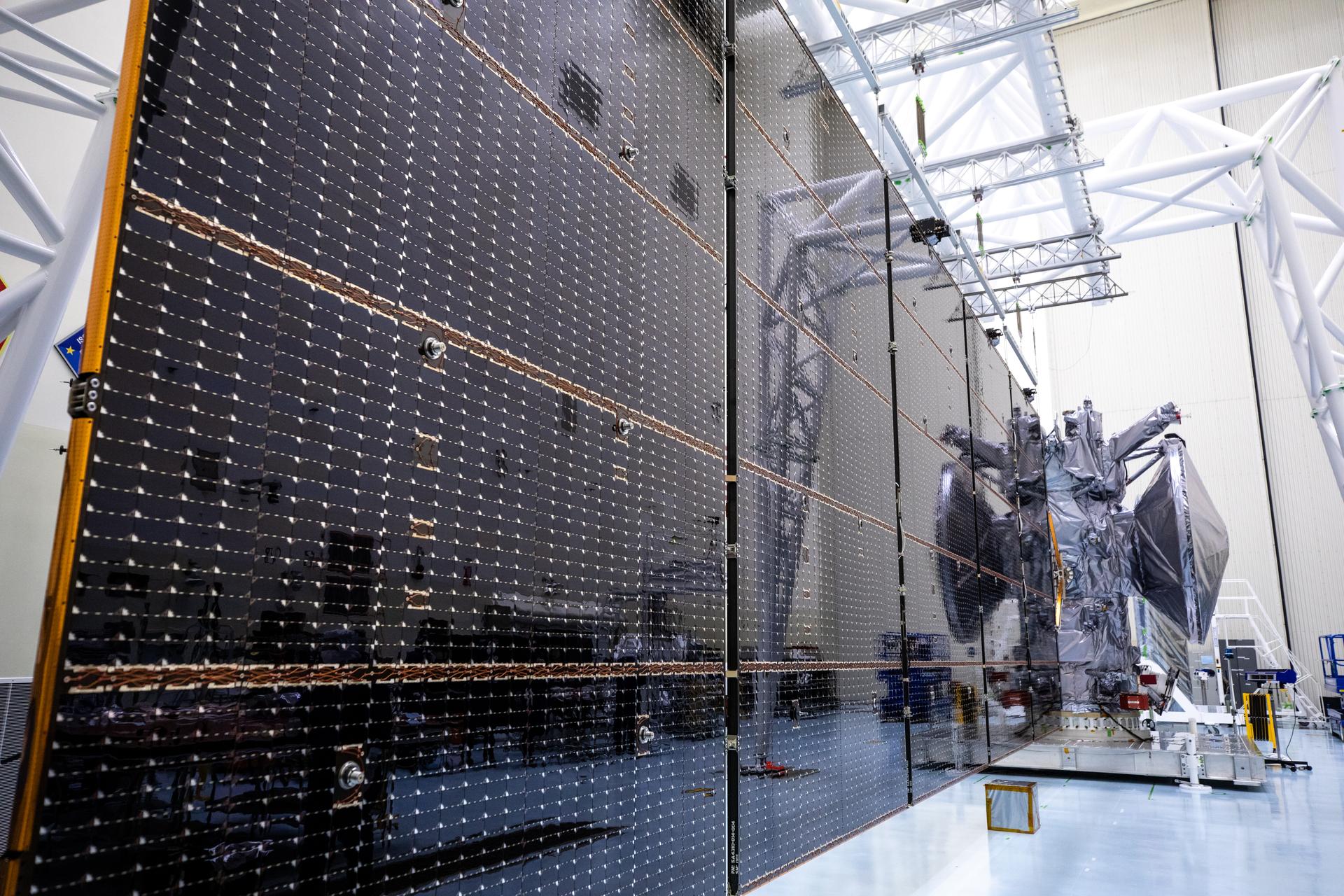NASA Invites Media to View Launch
of Jupiter Moon Mission
Sep 03, 2024 MEDIA ADVISORY M24-120 Technicians test a set of massive solar arrays measuring about 46.5 feet (14.2 meters) long and about 13.5 feet (4.1 meters) high for NASA’s
Europa Clipper spacecraft inside the agency’s Payload Hazardous Servicing Facility at Kennedy Space Center in Florida on Aug. 7. Credits: NASA/Kim Shiflett
NASA and SpaceX are targeting a launch period opening Thursday, Oct. 10, for the agency’s Europa Clipper mission, which will help scientists determine if one of Jupiter’s icy moons
could support life. The mission will launch on a SpaceX Falcon Heavy rocket from Launch Complex 39A at NASA’s Kennedy Space Center in Florida.
Europa Clipper will carry nine instruments and a gravity science experiment aboard to gather detailed measurements as it orbits Jupiter and conducts multiple close flybys of its moon,
Europa. Research suggests an ocean twice the volume of all of Earth’s oceans exists under Europa’s icy crust.
Media interested in covering the Europa Clipper launch must apply for media accreditation. Deadlines for
accreditation are as follows:
Media requiring special logistical arrangements, such as space for satellite trucks, tents, or electrical connections, should email ksc-media-accreditat@mail.nasa.gov by
Tuesday, Oct. 1.
A copy of NASA’s media accreditation policy is available online.
For questions about accreditation, please email: ksc-media-accreditat@mail.nasa.gov. For other mission questions, please contact NASA Kennedy’s newsroom at 321-867-2468.
Para obtener información sobre cobertura en español en el Centro Espacial Kennedy o si desea solicitar entrevistas en español, comuníquese con Antonia Jaramillo: 321-501-8425, o
Messod Bendayan: 256-930-1371.
Accredited media will have the opportunity to participate in a series of prelaunch briefings and interviews with key mission personnel, including a briefing the
week of Sept. 9. NASA will communicate additional details regarding the media event schedule as the launch date approaches.
NASA also will post updates on spacecraft launch preparations on NASA’s Europa Clipper blog.
Clipper’s primary science goal is to determine whether there are places below the surface of Europa that could support life. The mission’s three main science objectives are to understand
the nature of the ice shell and the ocean beneath it, along with the moon’s composition and geology. The mission’s detailed exploration of Europa will help scientists better understand the astrobiological potential for habitable worlds beyond our planet.
Managed by Caltech in Pasadena, California, NASA’s Jet Propulsion Laboratory in Southern California leads the development of the Europa Clipper mission in partnership with the Johns
Hopkins Applied Physics Laboratory (APL) in Laurel, Maryland, for NASA Headquarters in Washington. The main spacecraft body was designed by APL in collaboration with JPL and NASA’s Goddard Space Flight Center in Greenbelt, Maryland. The Planetary Missions
Program Office at NASA’s Marshall Space Flight Center in Huntsville, Alabama, executes program management of the Europa Clipper mission.
NASA’s Launch Services Program, based at Kennedy, manages the launch service for the Europa Clipper spacecraft.
For further details about the mission and updates on launch preparations, visit:
https://science.nasa.gov/mission/europa-clipper
-end- |

